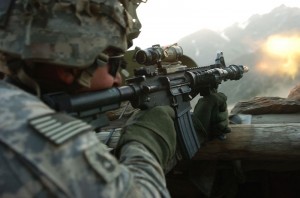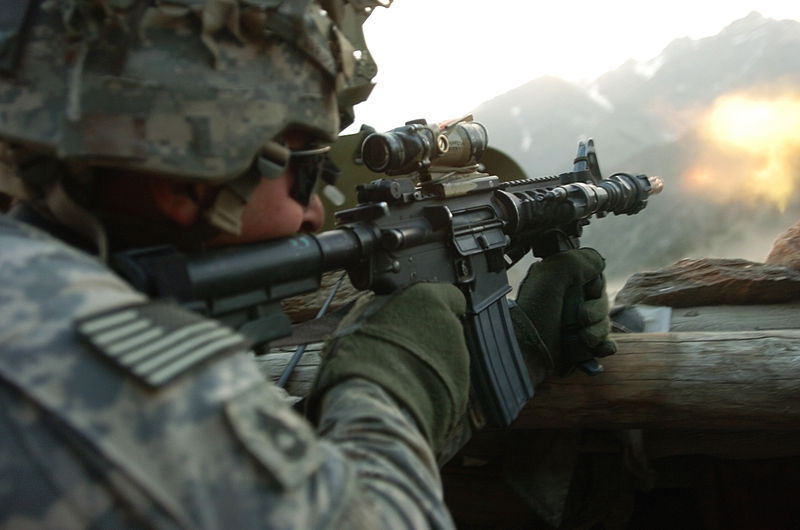
The recent news out of Afghanistan is grim. On the heels of a burning of Qurans (along with other Islamic literature) that sparked mass protests in the country, the massacre of 16 civilians, nine of whom were children and three of whom were women, by a lone U.S. gunman; now Afghanistan’s President Hamid Karzai has demanded that foreign troops of the U.S. & NATO-led International Security Assistance Force (ISAF) pull out of villages. The Taliban has also announced they are suspending talks with the U.S. in Qatar.
It is perhaps the longest war in U.S. history (this claim is disputed). For much of it’s history, it was unpaid for, and has contributed greatly to our deficit; unlike in past wars, we did not increase taxes for a wartime footing (indeed, we started another unfunded war in the same time period). But this does not mean we have not paid a cost; we have given the lives of my generation to the war. And because this cost has been paid in lives, it has made us irrational.
There’s a thing called the sunk cost fallacy: that if you’ve invested in something, you need to keep investing in it, even if it’s not working and just an unnecessary cost. This describes our policy in Afghanistan. Now, President Barack Obama and Prime Minister of the United Kingdom David Cameron have both said they intend to hold the course. But the fact of the matter is that it makes no sense. Afghanistan has become NATO’s sunk cost. We are losing money and lives there, the situation is not improving, and there are clear benefits to leaving.
Even the purpose of the war, as stated by both former President George W. Bush and President Obama, defeating Al Qaeda and Osama Bin Laden, is completely ended. I can remember the night Bin Laden was killed. I came home, went to my computer and checked my Facebook. People were saying that Bin Laden was dead. I checked on it on the news, and sure enough, it was credible. A short while later, a friend contacted me.
“Wow. We got Osama,” he said.
“Yeah,” I replied. Then a short while later, “can we go home now?”
Much has since been made of the celebrations that night; that we reveled in the death of an enemy, that it was unbecoming of us, that we should’ve soberly reflected on what this one man’s death had cost us. I don’t believe that we were truly celebrating Bin Laden’s death. I believe that in our heart of hearts, we were celebrating the end of the war. If President Obama had announced the end of operations in Afghanistan at his press conference, it would’ve been a fitting end to a disastrous war. Instead, we will linger on; unwanted by the people of Afghanistan, unwanted by the people of America.
Our best military officers recognize the situation as untenable. General David Petraeus abandoned Afghanistan for a civilian post at the Central Intelligence Agency rather than have his career blemished by failure in the Central Asian country. Our military policy; “counter-insurgency” (COIN), is based on the writings of an obscure Frenchman who fought in a peaceful sector of France’s defeat in the Algerian War of Independence. Each successive general in Iraq, from David McKiernan, to Stanley McChrystal, to David Petraeus, to John Allen has portrayed their COIN policy as a break from the previous commander’s. Each has failed to produce results.
The reality is that COIN produces no solutions without horrific inhumanity. Its most-cited success, the Malay Emergency, relied on the massacres of ethnic Chinese insurgents by Malays while the British imperials of the time quietly watched (this is called “winning the hearts and minds”). America has no intention of replicating such policy; for good reason. To those who cite the end of war in Northern Ireland, they should be reminded that the IRA managed to successfully change its tactics from targeting people to targeting capital. If a military solution had been successful in Northern Ireland, the British government would’ve never gone to the negotiating table. Military solutions against insurgencies have a terrible success rate. Successful policing and negotiation are the most successful ways out.
As callous as it is, the reality is that we cannot stabilize Afghanistan. We destroyed its stability (what little there actually was), and we cannot replace it. President Bush was mocked by Jon Stewart when he claimed that “success in Iraq is not no car bombs.” Little did we know that he would be right. Can we honestly look ourselves in the eye and say that we won in Iraq? Of course not. There was nothing to win. If anything, we handed a victory to Iran and damaged the useful myth of American superiority. We likewise have found there is nothing to win in Afghanistan.
The victor in these wars will be anyone who chose not to get into them. We have wasted eleven years in wars we should not have fought. President Obama, don’t make us waste thirteen.





